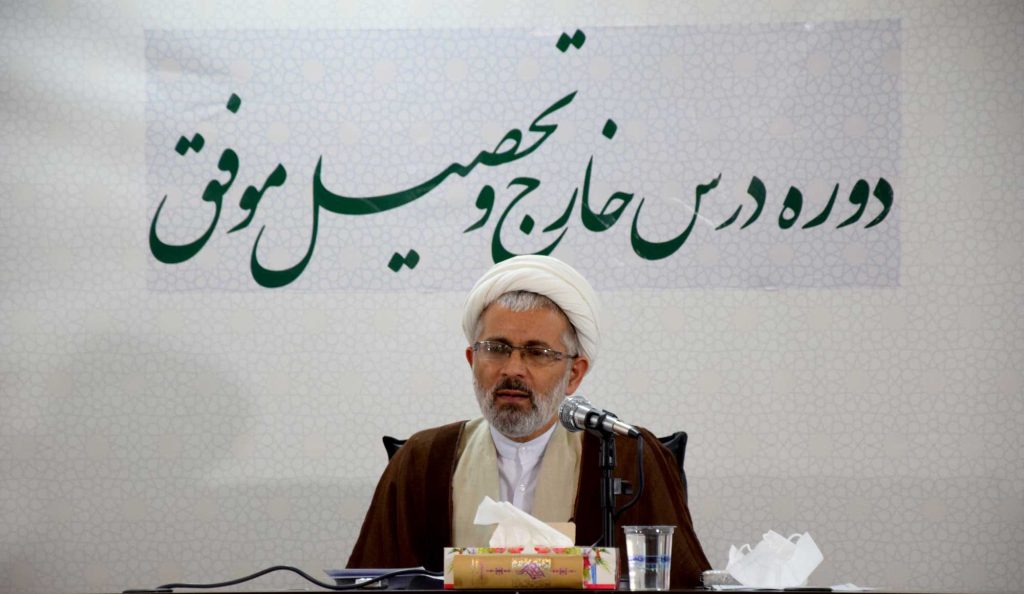Course Overview
Course Subject: Jurisprudence of Insurance
Instructor: Shaykh Muḥammad Taʿẓīmīfar
Day and Time: Sundays and Tuesdays, two hours before sunset.
Location: Higher Institute of Jurisprudence and Islamic Sciences, Ṣadūqī Complex, Qom, Iran
Course in Social Media: https://eitaa.com/fiqh_tazimifar
About the Course
Traditionally, jurisprudential issues are divided into two categories: acts of worship and transactions, and the same division is also seen in advanced courses of jurisprudence. The first category deals with acts of worship such as prayer, fasting, khums, zakāt, ḥajj, and jihād, one of their conditions being the intention of getting closer to God (al-taqarrub). The second category is related to commercial transactions between people, which are mainly related to everyday worldly issues and the intention of closeness to God is not a condition. Based on this, usually in the books of jurists, the first part deals with the rulings related to acts of worship and the second part deals with the rulings related to transactions. Accordingly, they have also studied these topics in their advanced courses in jurisprudence.
Due to the fact that transactions are always being updated and especially in recent decades, new contracts are always emerging, one of the new titles in books of jurisprudence and advanced courses on jurisprudence is “new contracts” (al-ʿuqūd al-mustaḥditha). New transactions are among the achievements of economic knowledge in the field of economic methods and software, which has a wide scope in the micro and macro economy among nations and governments. Therefore, knowing and applying them in personal and governmental economy and international business relations is one of the clear necessities in today’s life. According to the Shiite view of jurisprudence and the principles of jurisprudence, jurists have always been able to examine all emerging issues, including new contracts, based on jurisprudential sources, and extract relevant jurisprudential rulings from the sources.

One of the new issues in transactions that is very common and practical in our time and has been examined by Shiite jurists at the same time, is insurance (such as life insurance, vehicle insurance, home insurance, and health insurance). Today, one of the economic industries that has a high financial turnover at the international level, as well as small and domestic businesses, is the insurance industry, so that all industrial, economic and service sectors are related to insurance in one way or another, and in the absence of it, growth and development in the mentioned fields will be impossible or very slow, and this dependence has caused the expansion of the insurance institution to the point where today there are more than a hundred types of insurance contracts in bilateral relations.
Due to the popularity of insurance contract, it is inevitable to deal with its related religious laws (both regarding the essence of insurance and its types and divisions). Insurance as an obligation of the parties is the result of special economic and responsibility needs, which constitute its essential elements and determine many of its rulings, and on this basis, it is necessary to examine this contract with a specialized jurisprudential point of view and explain the view of religion in many details related to it.
In Islamic jurisprudence, the payment of damage and its guarantee by a third party (other than the injured party and the one causing the damage) is not unprecedented, but these rulings are inherently different from the insurance institution in terms of their origin, and therefore the comparison of these contracts is challenging. These discussions have made insurance as a new issue to the attention of Shiʿa and Sunni jurists, and therefore they have expressed different views on its legitimacy.

One of the most fundamental questions that is investigated in jurisprudence of insurance is whether insurance can be considered an independent religious contract or not, and if the answer is negative, can it be considered under another religious contract? And in any case, which of the types of insurance are legitimate and what are the conditions of a legitimate insurance? Some of the most important issues raised in jurisprudence of insurance are as follows: the definition and types of insurance, the basic principles of insurance, the four pillars of insurance (the one who undertakes the obligation to pay the damage, the one who pays money to be insured, the money that the insurer pays for the damage, and the money the policyholder pays), the characteristics of the insurance, general and specific reasons that prove the legitimacy of the insurance, and obstacles to the validity of the insurance.
About the Instructor

Born in 1343 AH (solar) in Kāshān, Iran, Shaykh Muḥammad Taʿẓīmīfar Joined the Islamic Seminary of Isfahan in 1361 AH (solar) and the Islamic Seminary of Qom in 1363 AH (solar). Among his teachers, mention can be made of Shaykh Pāyānī, Shaykh Iʿtimādī, Ayatollah Shab Zindidār, Ayatollah Wahīd Khurāsānī, and Ayatollah Tabrīzī. He defended his third-level thesis (on ḥadīth lā tuʿād) and fourth-level thesis (on ḥukm al-ziyāda fī al-ṣalāt) in 1379 AH (solar) and 1385 AH (solar) respectively. As a researcher, he has collaborated with the Baqiyyat Allah al-Aʿẓam Institute and has also acted as a supervisor, advisor or referee in several theses in the Islamic Seminary of Qom. He started teaching advanced courses of jurisprudence and principles of jurisprudence in 2016. Among his advanced courses on jurisprudence and principles of jurisprudence mention can be made of prayer, conventional person, and practical principles (al-uṣūl al-ʿamaliyya).
